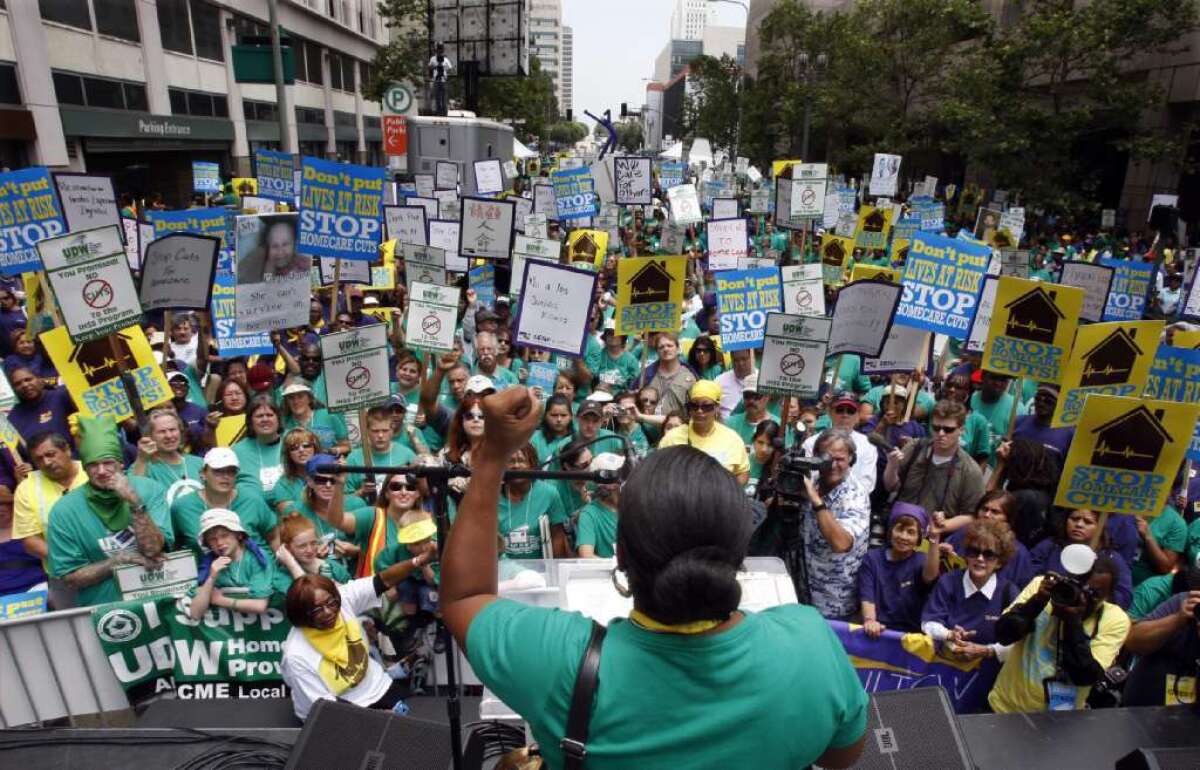An awful idea: Hammer the disabled to pay for unemployment benefits

It would take the pen of Jonathan Swift* to fully describe Congress’ willingness to beat up on the least fortunate members of society to protect the richest. The latest example is a plan to pay for a one-year extension of unemployment insurance by cutting Social Security benefits for the disabled.
This flinthearted idea has been endorsed by Senate Democrats, of all people, who have written it into a proposal that could reach the floor as early as Monday. Its chief sponsor is Sen. Jack Reed (D-R.I.) but it’s got the support of Senate Majority Leader Harry Reid (D-Nev.) too.
Advocates for Social Security and for disabled workers are in a fully justified uproar over this measure for two main reasons: It uniquely burdens the disabled among all workers, and it sets a terrible precedent of raiding Social Security to pay for other social programs. As a coalition of disabled advocacy groups put it in a letter to Sen. Tom Harkin (D-Iowa) chairman of the Committee on Health, Education, Labor, and Pensions, the measure would mean “worsening the economic security of workers with disabilities and their families at a time when the economy continues to struggle.”
How crucial is this offset for the federal budget, you fiscal hawks in Washington? It would save about $100 million a year. That’s less than three thousandths of a percent of the annual federal budget. Sure, fiscal responsibility has to start somewhere, but surely there are deeper pockets to mine than those of disabled people struggling to make ends meet.
The offset, moreover, is based on the unjustified treatment of disability pay and unemployment compensation as somehow two sides of the same coin, so that receiving one should disqualify you from the other.
The idea that disabled persons are “double-dipping” by collecting wages or other compensation while also getting a disability check is enshrined in conservative attacks on disability. But it’s untrue. The Social Security disability program is designed as a bridge to full employment. Its benefits aren’t intended as a substitute for wages, but a supplement.
As the Center on Budget and Policy Priorities observes, disabled beneficiaries can earn up to $1,070 a month in wages this year without jeopardizing their benefits so they can “test their ability to return to work” and ease their transition back into the labor market.
The average monthly disability benefit was about $1,130 last year and the average unemployment check $1,200, so no one is getting rich here. Add together the averages, and we’re still talking about poverty level income for a family of four.
The coalition of disability groups points out that the unemployment and disability programs were designed for different purposes and for the most part serve different populations. But there is an overlap estimated at about 117,000 of the 8.9 million Americans receiving disability, according to Rebecca Vallas of the National Organization of Social Security Claimants’ Representatives, a leading advocacy group.
These are people who have passed through the very stringent gantlet necessary to qualify for disability benefits, and they’ve also worked long enough to become eligible for unemployment. There’s no justification in law or logic for offsetting one benefit by the other.
Vallas and other advocates are especially nervous that this sort of proposal encourages lawmakers to view Social Security benefits as a “piggy bank” to pay for other social programs. “It’s death by a thousand paper cuts to call this a pay-for” to cover the expansion of unemployment insurance, she says.
But the idea is becoming disturbingly common in Washington. The disability-unemployment offset also appeared in President Obama’s 2014 budget proposal, which called it a “smart reform ... [to] root out duplicative or wasteful spending.” (The budget hasn’t been passed.)
It’s anything but a “smart reform”: It’s a hacking away at the safety net for the disabled and unemployed that only a Scrooge would contemplate. The very idea that we should bill the disabled to pay for benefits for the jobless suggests that our national standards of fairness and civilization have fallen very, very low indeed. This is a proposal that should die in its crib.
*To paraphrase the late Alexander Cockburn.
More to Read
Get the L.A. Times Politics newsletter
Deeply reported insights into legislation, politics and policy from Sacramento, Washington and beyond. In your inbox three times per week.
You may occasionally receive promotional content from the Los Angeles Times.










